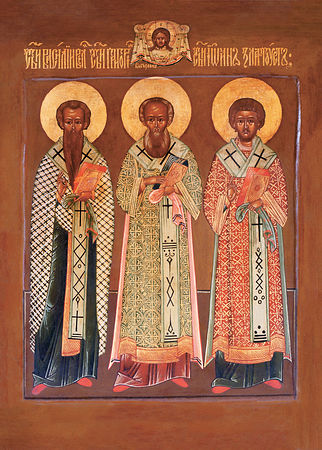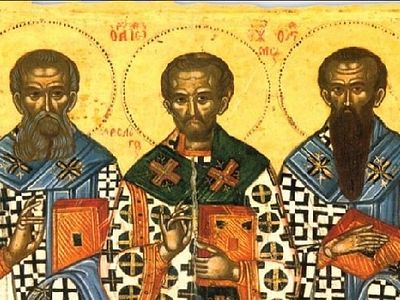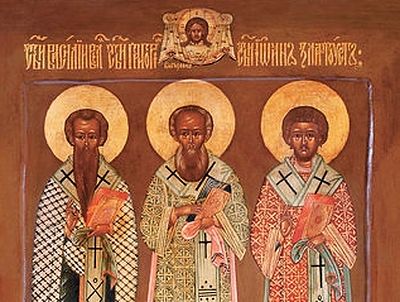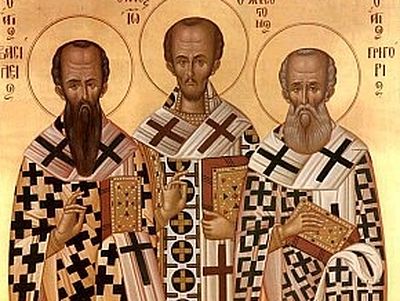 Synaxis of the Three Holy Hierarchs.
Synaxis of the Three Holy Hierarchs.
In celebrating these three great teachers of the Church, the Church in its hymnody refers to them as “harps of the Spirit,” “rays of light,” “scented flowers of Paradise,” “instruments of grace.” The Gospel read at Divine Liturgy is that of the Good Shepherd (John 10:9-16). This gospel, always appointed to be read on feast days of canonized bishops, speaks to us of the God-given role of the episcopacy to watch over our souls.
In these three great shepherds of the Church, we see both a commonality and differences that can enlighten us in how we lead our lives as Christians. Honored as supreme representatives of both the Church’s doctrinal and pastoral ministries, these men give us true examples of what it means to be Orthodox.
St. Basil the Great (330-379), though known throughout Orthodoxy because of the Divine Liturgy that bears his name, was perhaps first and foremost a man of charity and compassion. Known as a protector of the weak and defender of the poor, St. Basil built hospitals, organized charities, cared for orphans and widows and emphasized acts of mercy on the part of all Christians.
A great defender of the faith in powerful writings and homilies, and known as an organizer and reformer of monasteries, St. Basil more than anything else burned with a heart of compassion, living out the words of Christ, “Inasmuch as you do it unto one of these little ones, you do it unto me.”
St. Gregory the Theologian (329-389), a friend and classmate of St. Basil, was made a bishop against his wishes. Facing many challenges in the see of Constantinople, St. Gregory spent the final years of his life in retreat. Out of his meditations on God came beautiful poetry and some of the most powerful defense of the doctrine of the Holy Trinity ever written. While active as a powerful and compassionate bishop in the world, St. Gregory never lost sight of “the kingdom of God within you.” A man of prayer, inward spirituality and meditation, St. Gregory produced the fruit of the “hidden life in Christ” which each of us must develop within our own hearts.
St. John Chrysostom (345-407) became bishop of Constantinople after 12 years of priesthood in Antioch. Perhaps the greatest preacher the Church has ever produced, St. John’s lifetime of sermons emphasize Christian morality and how we should conduct ourselves as Christians in the world. For St. John, our Christian faith encompasses every aspect of our lives and is to be manifested in every “word, deed, and thought.”
In the lives and ministry of these three men, we see the fullness of what it means to be a Christian. In St. Basil we see mercy and compassion. In St. Gregory we see the development of an inner life grounded in an abiding personal relationship with Christ. In St. John we see a faith that permeates every aspect of our lives and calls us to conduct befitting the name Christian.
Are we a people of mercy and compassion? Are we a people who seek a personal inner life of prayer and meditation? Are we a people who live the life of a Christian rather than being a Christian in name only?
As we celebrate the Feast of the Three Holy Hierarchs, let us be inspired by these great teachers of the Church to strive toward the “prize of our high calling” and place Christ at the center of all we are and all we do.
* * *
Troparion, Tone 1
Let all who love their words come together and honour with hymns the three luminaries of the light-creating Trinity: Basil the Great, Gregory the Theologian, and renowned John of golden speech, who have enlightened the world with the rays of their divine doctrines, and are mellifluous rivers of wisdom who have watered all creation with streams of divine knowledge; they ever intercede with the Trinity for us.
Kontakion , Tone 2
Thou hast taken the sacred and divinely inspired heralds, the crown of Thy teachers, O Lord, for the enjoyment of Thy blessings and for repose. For Thou hast accepted their sufferings and labours above every burnt offering, O Thou Who alone dost glorify Thy Saints.
from The Word, January 2001



